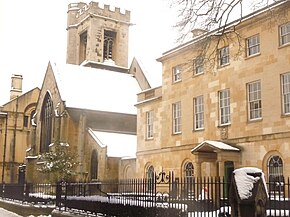New Inn, Oxford
| St Peter's College | |
|---|---|
 |
|

Blazon: Per pale vert and argent, to the dexter two keys in saltire or surmounted by a triple towered castle argent masoned sable and on the sinister a cross gules surmounted by a mitre or between four martlets sable, the whole within a bordure or.
|
|
| University | Oxford |
| Location | New Inn Hall Street |
| Coordinates | 51°45′10″N 1°15′39″W / 51.752762°N 1.260721°WCoordinates: 51°45′10″N 1°15′39″W / 51.752762°N 1.260721°W |
| Latin name | Collegium Sancti Petri-le-Bailey |
| Established | 1929 (attained full college status in 1961) |
| Named for | Saint Peter |
| Previous names | St Peter's Hall (1929-1961) |
| Sister college | None |
| Master | Mark Damazer |
| Undergraduates | 342 (2011/2012) |
| Postgraduates | 130 |
| Website | www |
| Boat club | Boatclub |
| Map | |
St Peter's College is one of the constituent colleges of the University of Oxford and is located in New Inn Hall Street, Oxford, United Kingdom. It occupies the site of two of the university's oldest inns, both of which were founded in the 13th century. The modern college was founded as St Peter's Hall in 1929 by Francis James Chavasse, Bishop of Liverpool, and achieved full collegiate status in 1961, becoming St Peter's College. In 1979, it began to admit women.
As of 2014, the college had an estimated financial endowment of £29 million.
St Peter's occupies the site of two of the university's oldest inns, or medieval hostels: Bishop Trilleck's, later New Inn Hall, and Rose Hall. They were both founded in the 13th century and were part of the university. During the First English Civil War, the university's college plate was requisitioned by the King's Oxford Parliament and taken to New Inn Hall to be melted down into "Oxford Crowns". In the 18th century, William Blackstone became the Principal of New Inn Hall after being appointed the Vinerian Professor of English Law at Oxford. New Inn Hall and Rose Hall later became part of Balliol College.
The history of the college in its present form began in 1928 when St Peter's Hall opened as a hostel with 13 residents. In 1929 it received a licence as a hall with 40 members. The founder of the institution was Francis James Chavasse, Bishop of Liverpool, who was concerned at the rising cost of education in the older universities in Britain, and projected St Peter's as a college where promising students, who might otherwise be deterred by the costs of college life elsewhere, could obtain an Oxford education.
...
Wikipedia

